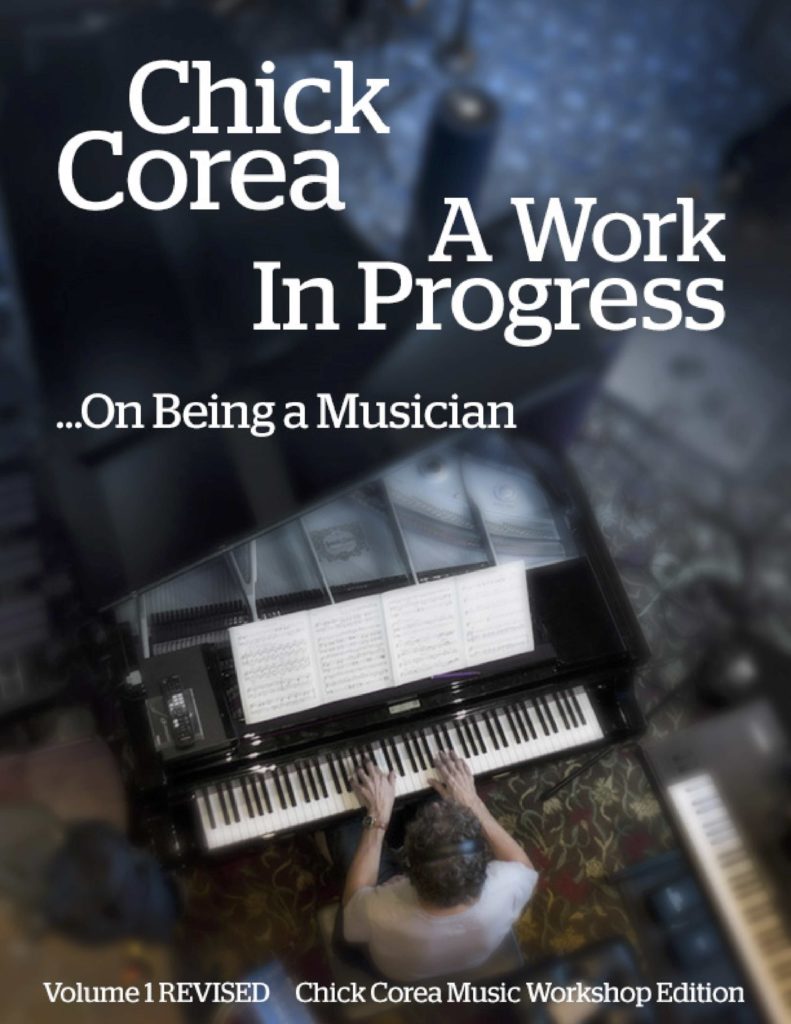
This 40-page book by Chick Corea was something I got via his Music Workshop a few years ago. After reading a recent email from Chick’s newsletter, I decided to revisit and review this book. Just for the record, I’m reviewing based on the Chick Corea Music Workshop Edition that was included with his one on one online 2-day workshop. It looks like there is a physical version available via his official online store here.
The book is divided in 6 chapters & a glossary section:
- Chapter 1: Introduction
- Chapter 2: Personal Policies as a Musician
- Chapter 3: Playing the Piano
- Chapter 4: Comping
- Chapter 5: Making Time
- Chapter 6: Composing
- Glossary
In the intro to the introduction (yes!), Chick explains how the book came about and how this is a collection of ‘advice’ from him for musicians. He shares how he was initially reluctant to do so because everyone is on their own path. Then, he realised that people have benefitted from the advice (when he gave it) and so he collected his thoughts in this book.
Chapter 2 goes into 19 very practical policies that he uses to guide his musical and career choices. They range from how he composes, dealing with the reception of the music as well as dealing with the business side of things. The chapter is short but shows a lot of thought that he’s put in from his years of experience. Definitely one to be reread & digested again and again.
Chapter 3 is a great breakdown of his process of learning the piano. From basics like scales & arpeggios to practical ways of going from emulation to developing a personal style. Chick also talks about piano technique, practice and how to approach theory & practice. Closing the chapter, there’s also a list of pianists who he’s studied and been inspired by. This is valuable if you’re curious about where he’s coming from.
In Chapter 4, comping is explained in a very elegant way. I love this part as Chick manages to distill the essence of comping. For pianists who are looking beyond just a list of voicings and transcriptions, Chick gives a lot of food for thought in this part.
Chapter 5 goes into time, talking about practicing to develop a good time feel, using metronomes, about click tracks, pulse & time flow as well as playing fast.
Chapter 6 goes into his creative process when composing, considerations for notation including how he writes, edits and how he creates parts for the musicians. This is also an insightful part of the book.
In conclusion, this isn’t a big book by any means (at 40 pages) but the content is really valuable and something that can help dedicated musicians looking for answers, guidance and perhaps reassurance. Interestingly enough, even though I already have the eBook, I am tempted to get the physical copy of the book so that I can hold it & read it more comfortably. I guess I’m just old school like that.
TLDR: If you’re a Chick Corea fan, a jazz pianist or just someone interested in jazz piano (and the creative process), this is a great book to read for some insights from Chick.
Get your copy here: https://shop.chickcorea.com/products/a-work-in-progress
[Review Archive]
I wrote a lot of other book, course and video reviews too.
Check out the rest here:
[Read more reviews]
[Submissions for Review Consideration]
- Are you an author who wrote a jazz, guitar or music book?
- Have you created a DVD or an online video course or subscription based website?
- Would you like me to review your book/course?
Please send me a message at azsamad2 at gmail.com with:
For courses: a link to the course/video/product + access info etc.
For books: a link to the book (Dropbox) or PDF attachment (if it’s small) for review consideration.
Depending on whether I dig the book/course, I’ll let you know if I do plan to review it!
I cannot guarantee a review for every submission & if I’m not too into it, I may opt not to review it. I mean, it’s better to get a good review that for me to write a bad review just because it’s not a match for the kind of stuff I dig right? :p
NOTE: All reviews reflect my honest personal opinion so be aware that I will point out both cool Pros and Cons that I see in the work. You dig? 🙂